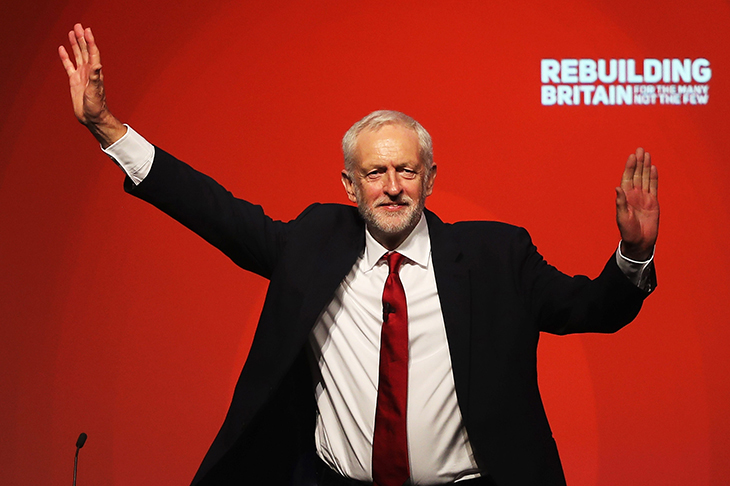The next general election will have been precipitated by, and will inevitably be fought over, Brexit. Yet it will also be the fiercest battle of ideas for more than a generation. Britain must choose between economic liberalism and a command economy, between a smallish state and a domineering one. This would be a crucial choice at any time, but the implications of Brexit make it more so. Jeremy Corbyn supported leaving the EU in 1975 for the same reason he can’t quite denounce Brexit now: a parliament that takes back control can be far more radical. And his Labour party has plenty of radicalism in mind.
Even though Labour occupies a lowly position in the polls, Corbyn remains overwhelmingly the main challenger to Boris Johnson and his warring Conservatives. We live in fast-changing political times: during the last general election campaign, Corbyn increased Labour’s share of the vote by more than any other leader of any other post-war party. To write him off now, after his astonishing progress in 2017, would be an act of reckless complacency on the part of the Tories.
It is Labour, rather than the Liberal Democrats, which has the electoral infrastructure to win a national election. Even if Corbyn cannot command a majority on his own he may be able to do so with the aid of the SNP, a party which will care little what pain it helps inflict on the rest of the UK so long as it wins the promise of a second independence referendum.
We have a good idea as to what a Corbyn government would look like because he has already produced one manifesto. We know that taxes would rise for the top 5 per cent of earners, with a new top rate of 52 per cent. We know that recent reductions in the rate of corporation tax would be reversed, and that Labour would try to renationalise utilities that were privatised in the 1980s and 1990s, and attempt to do so at below-market prices.
It is also becoming clear, from the speeches of John McDonnell in particular, that established Labour party policy is just the beginning of a socialist experiment. This week, McDonnell floated the idea of a ‘right-to-buy’ for tenants of privately owned properties, who would be offered the chance to acquire their home at a discount. His attempt to compare this with Margaret Thatcher’s right-to-buy for council homes ignores the fact that council homes were in the ownership of the state, so it was in the government’s gift to offer a discount on their purchase. To offer private tenants a discount verges on confiscation.
But this policy is entirely consistent with other ideas being discussed. Take Labour’s proposal to force companies with more than 250 employees to transfer 10 per cent of their stock to a fund for the benefit of their employees. Again, it is simple expropriation, violating the notion of property rights and stability that has long been central to Britain’s economic prosperity. It is hard to understate the value of our reputation. So far this year, the UK has attracted twice as much inward technology investment as all other EU nations put together. Why? Because investors trust our rule of law, and know that successful companies will not be seen as a target for government confiscation.
Who would want to invest in UK shares knowing that a Labour government had already snatched 10 per cent of company stock and could well come back for more? Many companies would relocate abroad, taking their profits and tax contributions with them. Today, the best-paid 1 per cent contribute 29 per cent of income tax collected. The lower-paid 50 per cent contribute less than 10 per cent. Never before have the poorer been asked for such a low share: this is progressive conservatism in action. The alternative, which will be the prospect before us in any forthcoming election, is a country that will be less fair, less free and much poorer.
Besides the confiscatory nature of many of Labour’s policies, the party has developed a taste for poking its nose into the running of private business. Its latest wheeze is to investigate the case for a mandatory four-day week. If this seems too fanciful to be introduced, then ask yourself how much of what is happening now in politics would have seemed incredible only a couple of years ago?
Forty years ago, Britain began a long journey from being a country weighed down by unproductive state-run businesses and appalling industrial relations to being an enterprise economy with a flexible labour market. Unemployment is the lowest in almost half a century. Income inequality is near a 30-year low. We have become a magnet for overseas investment, despite the chaos in Westminster. An election will hopefully sort out our relationship with Brussels. But even more importantly, it will decide whether Britain wants to continue to be an enterprise economy or to slip backwards into the socialist policies that did so much harm in the 1970s.
The Conservative party has become a fractious organisation in a poor state to fight any election, let alone one of this importance. But it must somehow muster some sense of unity and purpose. Three years ago, the successful Leave campaign focused on opening up the UK economy to the rest of the world and freeing ourselves from overbearing regulation. It will be ironic if instead of that we ended up with a Red Brexit. This is the choice that the next election will bring.
Got something to add? Join the discussion and comment below.
Get 10 issues for just $10
Subscribe to The Spectator Australia today for the next 10 magazine issues, plus full online access, for just $10.
You might disagree with half of it, but you’ll enjoy reading all of it. Try your first month for free, then just $2 a week for the remainder of your first year.














Comments
Don't miss out
Join the conversation with other Spectator Australia readers. Subscribe to leave a comment.
SUBSCRIBEAlready a subscriber? Log in